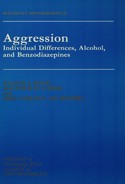Aggression as a behaviour and hostility as a feeling state are an increasing problem in many parts of the world including the UK Although much has been written about these phenomena, relatively few studies have attempted to analyse the behavioural, affective and cognitive components, nor to relate these to physiological responses accompanying the feeling of hostility or the behavioural repertoire of aggression. In particular, attempts to set up paradigms of aggressive behaviour in the psychological laboratory have been progressing slowly
Our own interest in the topic stems from several sources. First, our studies on anxiety, an emotion in response to stimuli perceived as threatening, overlapped inevitably with aggression as a complementary or alternative response. Second, our contact with psychiatric patients in our various clinics led to a practical concern with hostility as a primary aspect of these patients. Third, our psychopharmacological studies, especially of depressants such as alcohol and the benzodiazepines, caused us to address the specific issue of the effects of these drugs on hostility and aggression.
To that end, we adopted and adapted a laboratory model of aggression based on a competitive reaction-time task. Several studies have been completed but we have selected two clinical and three psychopharmacological studies as exemplars of the insight that can be obtained using psychological, psychophysiological, and psychopharmacological techniques in a multi-disciplinary approach. Part of this work formed the basis of a PhD thesis submitted to the University of London by J.C.C. da Silveira.
Alyson Bond
Malcolm Lader
Jose Carlos da Silveira
London, June 1996
